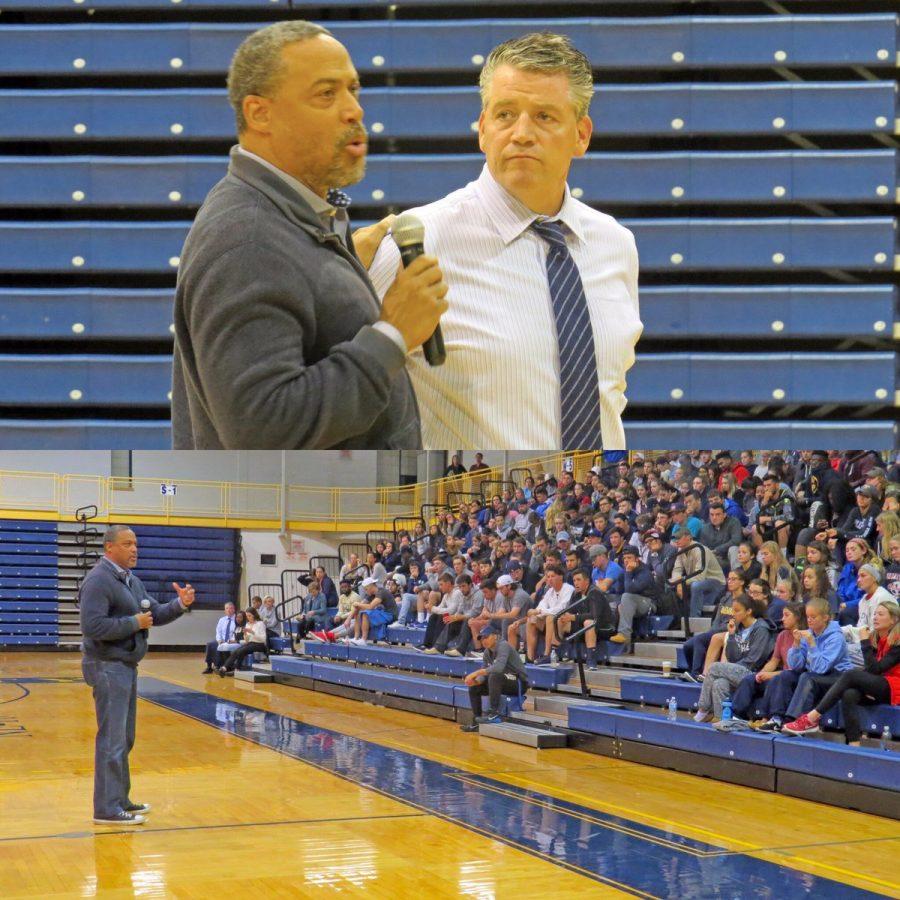Don McPherson Challenges Masculinity, Language and ‘Locker Room Talk’
College Hall of Fame Quarterback Dom McPherson speaks with student-athletes in Goldstien Fitness Center (Courtesy of Pace Athletics Twitter Page)
Former Syracuse College Football Hall of Fame Quarterback, Don McPherson, came to Pace University this Monday night to have an honest conversation with athletes about recognizing the truths of male behavior and men committing acts of violence in society and on college campuses.
He talked to students about the language they use to describe themselves noting that the language our society uses to define men and women creates gender inequality and promotes a culture of misogyny.
“What do we say men have to be? Strong, tough, brave, resilient, fearless and respectful,” McPherson said. “If you refer to a guy as an inanimate object or an animal it’s a compliment, but you compare him to his sister and it’s the ultimate insult. That is the misogyny. When we say ‘you throw like a girl’ we respond with ‘you have to man up’ and that’s the narrowness of masculinity, what it means to be a man.”
McPherson explained that using a female comparison to insult men creates a generalization that females are less than males. He believes whenever athletes or coaches use misogynistic and homophobic language to encourage others to perform better they contribute to the negative culture of our society.
“The language that we use is not loving or caring, it’s abuse. When a guy steps out of his box we call him a faggot or we call him pussy or bitch. I had a coach come up to me one time and say ‘I used that language today trying to motivate my players to be tougher.’ If you believe that other people are less, then you’re going to disregard their feelings and disregard their rights. That language is important because it creates an attitude,” McPherson said.
McPherson used his speech as a platform to make a statement about the way society perceives male conversations, referring to Donald Trump’s 2005 Access Hollywood comments off camera, reportedly bragging about kissing females and touching their genitals.
“This isn’t about Donald Trump. This about the excuse that we make for the language that we use as being ‘locker room talk’.” McPherson said. “All these professional athletes are getting involved because he was using that excuse. What he described himself doing is sexual assault, you can not grab somebody without her consent and then he blamed it on the tired, stereotypical narrative that in the locker room this is what goes on.”
Pace male athletes spoke about their perspective of locker room talk and how it is reflected within the sports teams on campus.
Football Captain Delaney Wallace didn’t agree with Trump’s comments stating that conversations disrespecting women do not occur within the Pace Football locker room
“I don’t think its locker room talk. I feel like that’s really a matter of the type of person that you are and who you are. I’m in a locker room, and that’s not necessarily what we talk about. Were talking about plays, were talking about funny things that have happened that are not necessarily to disrespect women. It’s not ‘locker room talk,’ that’s ignorant talk,” Wallace said.
Basketball player Bryan Rivers said that acknowledging language is important for men to truly understand the ramifications of their actions.
“We as men don’t really focus on what we say and, in certain situations, how we should [say something]. Its big especially in today’s world that we just assume things. Guys need to respect women,” Rivers said.
Rivers says his family roots have always taught him to be respectful to women but he will continue to work on his language when speaking about women.
“I have a mom and two sisters so, I’m very respectful to women but I feel language is huge. You don’t really know what you say, you just say it because it’s the ‘lifestyle’ of what we think we have to talk about,” Rivers said.“If you [speak that way] in the locker room with guys that you’re with every single day that respect you, they are going to take that and carry it on to guys, and friends that they have back home, or on campus and so one little moment in time can have a domino effect and it will just spread and everyone will respect women.”
McPherson travels to different campuses around the United States to speak to students about various social issues. He describes himself as a feminist and feels that although many men may not want to admit it, they are feminist as well.
Your donation supports independent, student-run journalism at Pace University. Support the Pace Chronicle to help cover publishing costs.


